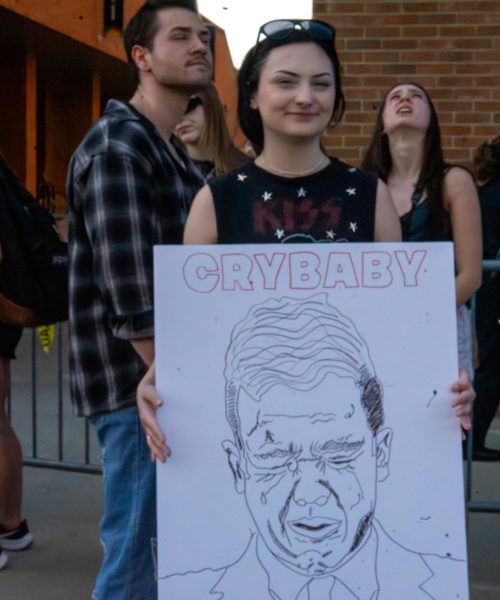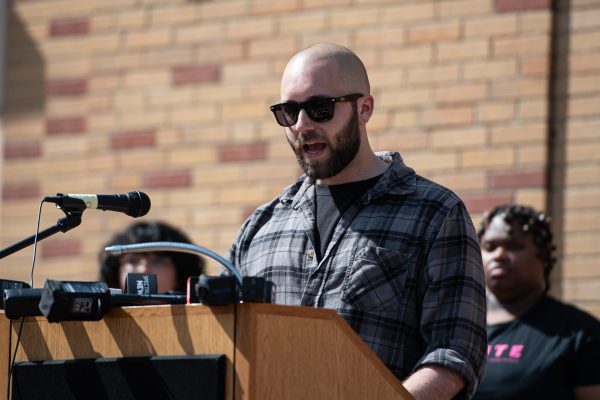Speaker discusses his Rwanda experiences
May 3, 2006
Paul Rusesabagina speaks about his experience during the Rwanda genocide last night in the Auditorium. MEGHAN GAURILOFF | DAILY KENT STATER
Credit: Carl Schierhorn
The entire audience gave a standing ovation to greet the hero who saved more than 1,000 lives during the genocide in Rwanda.
The University Auditorium was filled last night with faculty, students and community members to listen to Paul Rusesabagina speak about his experience in Rwanda. His speech was sponsored by the Symposium on Democracy and the Center for Student Involvement.
Rusesabagina said similar to Americans knowing exactly where they were on Sept. 11, he can recall exactly where he was when the massacre in Rwanda began.
According to BBC News, there was ethnic tension in Rwanda between the majority Hutus and the minority Tutsis. When Belgian colonists arrived in 1916, they saw differences between these two groups and produced identity cards to classify each individual. The Belgians considered the Tutsis superior to the Hutus. When president Juvenal Habyarimana died, the slaughter of the Tutsis and moderate Hutus began.
“This has a special interest to me because I am moving to Africa,” said Rachael Miller, senior marketing and psychology major. “We are living in the year of 2006 and still living with issues of genocide.”
According to the program, beginning April 7, 1994, Rusesabagina risked his life to save more than 1,200 Tutsi and Hutu Rwandans for 100 days when turmoil led to the massacre of nearly one million of his countrymen.
“People ask me why I decided to do this,” Rusesabagina said. “I tell them that I didn’t decide, God made me.”
He explained the feeling when the military showed up to his house. He said his family, neighbors and friends were shaking with fear about their fate. It was almost certain that they were all going to die.
Civilians were forced to murder others, Rusesabagina said.
“I don’t know how to use a gun,” he said. “I’ve never even touched a gun before.”
According to BBC News, some participants were offered incentives to kill Tutsis. Some civilians were forced to murder their neighbors by the military.
“My son went to visit one of his friends,” Rusesabagina said. “When he got there, his friend, mother and others were lying dead outside.”
Rusesabagina recalled a time when he was stopped by the military and held at gunpoint while transporting 32 passengers to his hotel. They were let go after he paid the government to be left alone.
“We stayed in the hotel without food or water,” he said. “Phone lines and electricity were cut off.”
Rusesabagina was born in Murama-Gitarama in Rwanda. His mother was a Tutsi, and his father was a Hutu. He founded the Hotel Rwanda Rusesabagina Foundation to aid to the survivors of Rwanda.
According to BBC News, the massacre ended in July. About 500 people were sentenced to death and more than 100,000 are in prison.
He wrote An Ordinary Man, a memoir based on his experiences during the genocide.
“Paul (Rusesabagina) is a very honorable man,” said Jacob Roope, sophomore speech pathology major. “Few people experience something like this in their lifetime. Not only did he better himself from Rwanda, but he can also better other people by creating awareness.”
Contact international affairs reporter Nicole Weible at [email protected].























